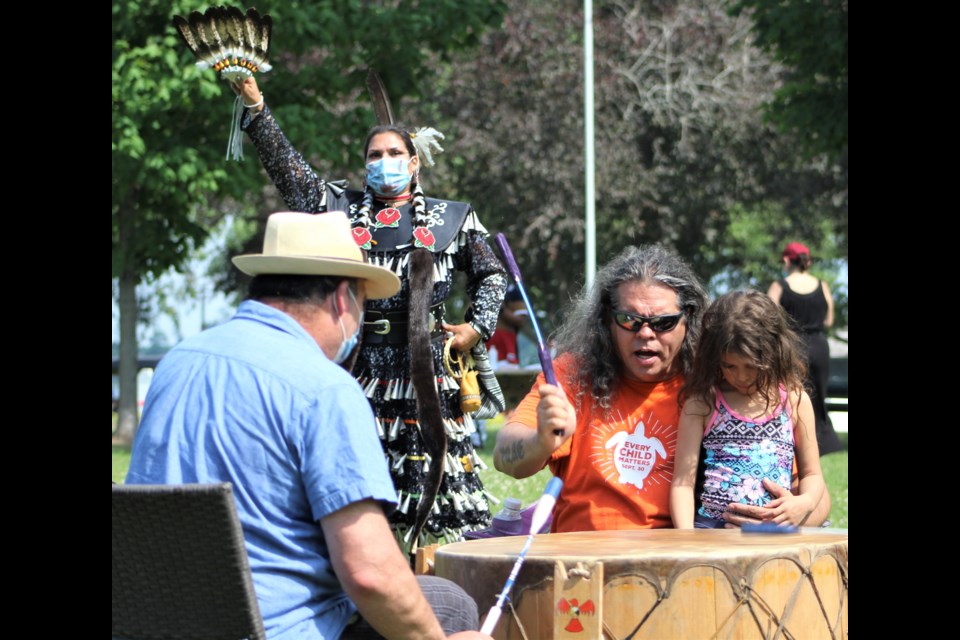For the second year in a row, a Canada Day demonstration in opposition to the Champlain Monument took place at Couchiching Beach Park.
A few dozen people showed up Wednesday for the Decolonize Orillia rally, where speakers shared their own experiences as well as some of the history of French explorer Samuel de Champlain’s time in the area.
“My people were here prior to Champlain,” Jeff Monague, of Beausoleil First Nation, said of the Anishinaabek. “When Champlain monopolized the trade, we had never seen that before on our land.”
The Anishinaabek then left the area and headed north because “we saw that something was going to happen here, and the Ouendat people almost went extinct because of that partnership they had.”
Despite conflicts at the time among some Indigenous nations, they now “live together and acknowledge one another,” Monague explained.
He hoped people who attended the rally would take the time to understand and acknowledge each other’s history.
Amanda Dale did her part to help with that. She has been compiling Indigenous history with the goal of educating others.
She reminded the crowd that Champlain and his crew, upon arriving in Quebec, were suffering from scurvy; Indigenous elders and healers helped save most of them.
When Champlain returned for a second time, he got lost in the woods. His crew asked the Indigenous people to help find him. Again, they saved the day.
However, Dale continued, some of Champlain’s explorers are said to have spread syphilis to Indigenous women and underage girls through sexual contact.
“Those children and women are the first missing and murdered Indigenous women,” she said.
As a white woman, Alana Bell was hesitant to speak at Wednesday’s rally, but her friend, Miranda Minassian, who organized the event, told her it was important to hear that perspective.
Bell said she always knew racism, oppression and genocide were “horrible,” but it wasn’t until recently that she took the time to educate herself about the history of that violence.
“I’m ashamed I didn’t learn sooner,” she said through tears. “We never spoke about anything. I climbed on that monument as a child. Not once did anyone in my family or in my life have a conversation about what it meant.”
Bell encouraged white people to “be an ally.”
"Listen and be willing to learn the truth about our history,” she said. “It needs to be awkward not to speak up.”
Minassian, who is not Indigenous but has faced racism as someone of Armenian descent, echoed Bell’s call to action.
“Indigenous communities have been resisting colonization for 200-plus years. It’s time to join them in this fight,” she said.
Simcoe North MP Bruce Stanton attended the rally and said it was an opportunity for everyone to listen and learn, “especially people who come from a more privileged background.”
“What Miranda is doing today is bringing people together and expressing their concerns, and I think they’re valid,” he said.
Dale had earlier said referring to Canada’s and Indigenous peoples’ past as a “shared history” was inaccurate — that Canada has 153 years of history while Indigenous people have a much longer one.
Stanton acknowledged the truth in that statement and said while today’s generations cannot be held responsible for the actions of those who came before them, “we have a duty to correct that going forward.”
Stanton said he accepted the conclusions from the working group that was formed to discuss the return of the Champlain Monument. However, he added, he also understands why it is offensive to some.
When the monument was unveiled in 1925, “we probably never imagined it would be something so debilitating to people who are impacted by it.”
Wednesday’s rally was peaceful, but it did get tense when a man on a motorcycle revved the engine a few times as Dale was speaking. When he continued to do so, Dale spoke louder and said she wouldn’t be silenced. Some of the demonstrators then confronted the man and had a heated argument about the monument.
